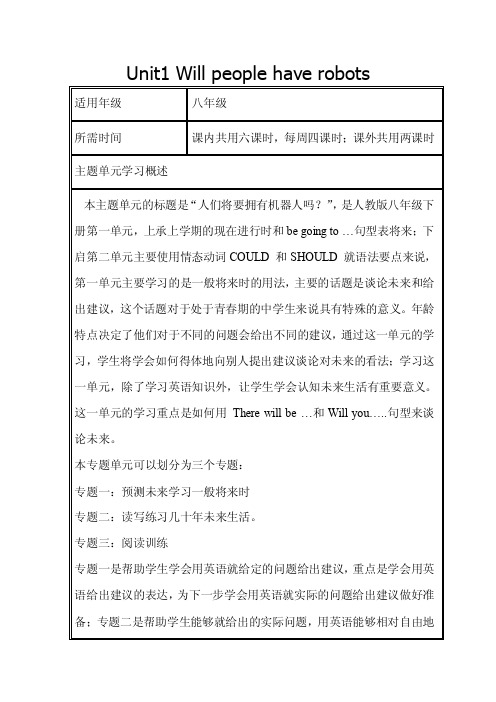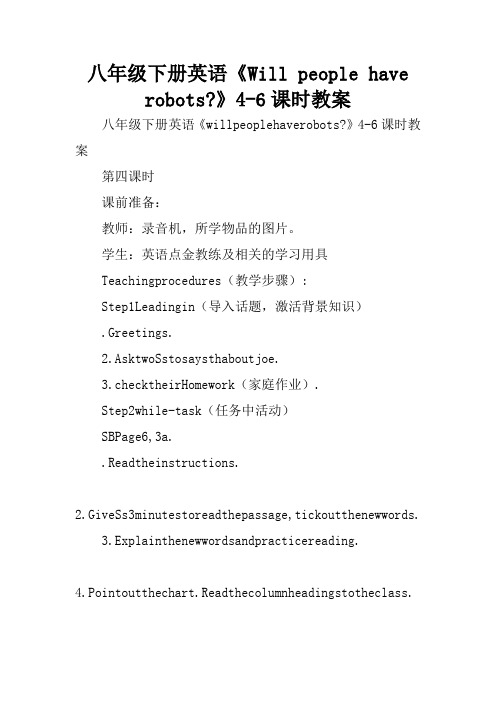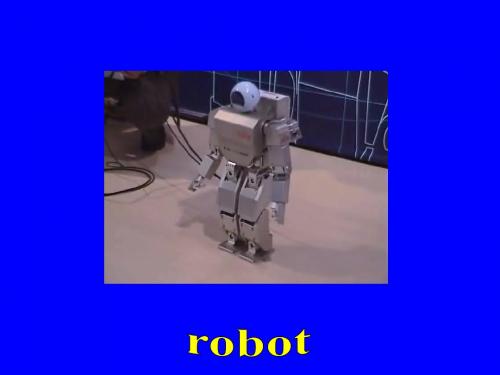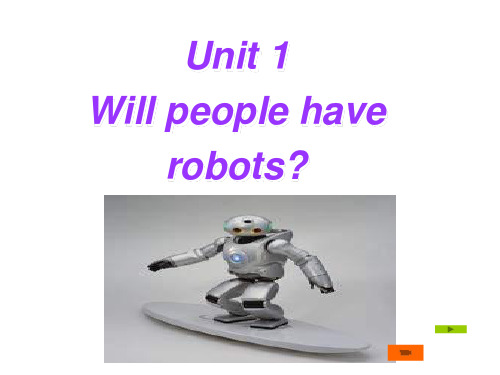八年级下册英语《Will people have robots-》4-6课时教案
八年级英语下册《Uni Willpeoplehaverobots》教案 人教版

教案:八年级英语下册《Unit Will people have robots》教案人教版一、教学目标1. 知识目标学生能够理解并运用目标句型"Will people have robots?" 进行询问和回答。
学生能够掌握表示将来的助动词"will" 的用法。
学生能够理解并运用词汇"robots, future, technology, advance, dly life" 等。
2. 能力目标学生能够听懂并能够运用目标句型进行简单的交流。
学生能够通过阅读和听力材料,提高获取信息的能力。
3. 情感目标学生能够激发对未来的好奇心,培养探索科技的兴趣。
二、教学重难点1. 重点目标句型"Will people have robots?" 的运用。
表示将来的助动词"will" 的用法。
2. 难点目标句型的适当变体和运用。
词汇"robots, future, technology, advance, dly life" 的运用。
三、教学方法采用任务型教学法,通过听、说、读、写等多种活动,让学生在实际语境中运用目标句型和词汇。
四、教学步骤1. 导入利用图片或实物展示的图片,引导学生谈论。
2. 新课呈现通过动画或视频展示未来的情景,引导学生理解并掌握目标句型"Will people have robots?"。
3. 操练学生两人一组,用目标句型进行问答,教师巡回指导。
4. 练习设计阅读材料,让学生通过阅读理解并运用目标句型。
5. 输出学生分组讨论,设想未来的,并用目标句型进行交流。
五、课后作业1. 抄写目标句型"Will people have robots?" 并进行问答练习。
2. 收集有关的资料,进行阅读理解练习。
3. 家庭作业:以小组为单位,编写一篇关于未来的短文,并展示给全班同学。
八年级英语下册《Uni Willpeoplehaverobots》教案 人教版

八年级英语下册《Will people have robots》教案人教版章节一:课题引入教学目标:1. 让学生了解发展的现状和未来趋势。
2. 引导学生思考人们是否会有。
教学步骤:1. 向学生展示一些的图片,让学生猜测这些的用途。
2. 引导学生讨论在我们生活中的作用,如清洁工、医生等。
3. 提问学生:“你们认为未来人们会有吗?为什么?”4. 让学生阅读课文,了解人们是否会有。
教学评价:通过学生参与讨论和回答问题的情况来评价学生的学习效果。
章节二:单词和短语学习教学目标:1. 让学生掌握课文中的生词和短语。
2. 培养学生正确使用这些单词和短语的能力。
教学步骤:1. 让学生跟读课文,标注出生词和短语。
2. 教师讲解生词和短语的意思,并给出例句。
3. 让学生练习使用这些单词和短语造句。
4. 进行小组活动,让学生相互练习使用生词和短语。
教学评价:通过学生造句的正确性和流利度来评价学生的学习效果。
章节三:课文理解教学目标:1. 让学生理解课文内容,掌握课文的主要观点。
2. 培养学生运用所学知识进行思考和分析的能力。
教学步骤:1. 让学生复述课文内容,检查学生对课文的理解。
2. 教师提问,引导学生深入思考课文中的观点。
3. 进行小组讨论,让学生分享自己的观点和看法。
4. 让学生写一篇短文,阐述自己对课文主题的理解和看法。
教学评价:通过学生复述课文、回答问题和小组讨论的表现来评价学生的学习效果。
章节四:语法学习教学目标:1. 让学生掌握本课所学的语法知识。
2. 培养学生正确运用所学语法知识的能力。
教学步骤:1. 讲解本课所学的语法知识,如时态、语态等。
2. 让学生进行语法练习,巩固所学知识。
3. 进行小组活动,让学生相互练习使用所学语法知识。
4. 让学生写一篇短文,运用所学语法知识进行表达。
通过学生语法练习的正确性和流利度来评价学生的学习效果。
章节五:课堂总结与作业布置教学目标:1. 让学生回顾本节课所学内容,巩固知识点。
八年级下册《Willpeoplehaverobots》说课稿

八年级下册《Willpeoplehaverobots》说课稿八年级下册《 Will people have robots 》说课稿作为一位兢兢业业的人民教师,通常需要用到说课稿来辅助教学,编写说课稿助于积累教学经验,不断提高教学质量。
如何把说课稿做到重点突出呢?下面是小编为大家收集的八年级下册《Will people have robots 》说课稿,仅供参考,欢迎大家阅读。
Teaching goals:1. Words&phrases: robot, paper, less, fewer, simple, unpleasant, factory, seem, etc .2. will 构成的.一般将来时态的陈述句、否定句、疑问句及回答.3. There be 句型的一般将来时.4. more , less , fewer 的用法.5. 学习一般将来时态的相关知识,学会对未来进行预测.6. 对five years ago ,today ,in five years 简洁回顾与展望的方式,贴近实际符合学生心理,激发学习兴趣.7. 通过时间对比复习一般过去时态、一般现在时态,巩固一般将来时.Important and difficult points :1. will构成一般将来时态的句式。
2. There be 句型的一般将来时态。
3. more , fewer , less 的用法。
4. How to make predictions .Period 1Teaching procedures:Step 1 Leading in1. Greetings: Welcome to school .What’s the date today ? Who’s on duty today ?Do you enjoy your winter holiday ?Do you finish your homework ?Do you want to live on the moon ?Can you guess what will happen in ten years ?Collect the Ss’ answers and say s omething about their predictions .Step 2 Pre-task SB Page 2 ,1a .1. Look at the picture :How will the world be different in the future ,100 years from now ?We’re going to talk about sth in 100 years .2. Read each predictions to the class .Explain the new vocabulary .3. Read the instructions .Make sure Ss know what they should do .4. Do it by themselves .5. Talk about the answers with the class .Explain :一般将来时态构成: will / be going to +动词原形Step 3 While-taskSB Page 2 ,1b .1. Practise reading the six predictions .2. Read the instructions to Ss .Circle the things you hear on the recording .3. Play the tape twice .4. Play the tape a third time .At the same time ,check the answers .SB Page 2 , 1c .1.Pay attention to the dialogues .2. Read the dialogues fluently .3. Pairwork .Work in pairs to make predictions according to the sample .4. Ask several pairs to share their conversations to the class .SB Page 3 , 2a & 2b .1.Read the predictions .2. Read the instructions and point out the sample answer .3. Play the tape twice .Ss circle the word they hear in each sentences: more , less , fewer .4. Check the answers .学生探究: less , fewer 的区别。
初中:八年级英语Will people have robots教案

新修订初中阶段原创精品配套教材八年级英语Will people have robots教案教材定制 / 提高课堂效率 /内容可修改This teaching plan is customized for the original teaching materials and is suitable for classroom teaching. The content can be modifiedaccording to the actual needs教师:风老师风顺第二中学编订:FoonShion教育八年级英语Will people have robots教案八年级英语will people have robots教案will people have robots 教案unit 1 will people have robots ?teaching goals:1. words&phrases: robot, paper, less, fewer, simple, unpleasant, factory, seem, etc .2. will 构成的一般将来时态的陈述句、否定句、疑问句及回答。
3. there be 句型的一般将来时。
4. more , less , fewer 的用法。
5. 学习一般将来时态的相关知识,学会对未来进行预测。
6. 对five years ago ,today ,in five years 简洁回顾与展望的方式,贴近实际符合学生心理,激发学习兴趣。
7. 通过时间对比复习一般过去时态、一般现在时态,巩固一般将来时。
important and difficult points :1. will构成一般将来时态的句式。
2. there be 句型的一般将来时态。
3. more , fewer , less 的用法。
4. how to make predictions .period 1teaching procedures:step 1 leading in1. greetings: welcome to school .what's the date today ? who's on duty today ?do you enjoy your winter holiday ?do you finish your homework ?do you want to live on the moon ?can you guess what will happen in ten years ?collect the ss' answers and say something about their predictions .step 2 pre-tasksb page 2 ,1a .1. look at the picture :how will the world be different in the future ,100 years from now ?we're going to talk about sth in 100 years .2. read each predictions to the class .explain the new vocabulary .3. read the instructions .make sure ss know what theyshould do .4. do it by themselves .5. talk about the answers with the class .explain :一般将来时态构成:will / be going to +动词原形step 3 while-tasksb page 2 ,1b .1. practise reading the six predictions .2. read the instructions to ss .circle the things you hear on the recording .3. play the tape twice .4. play the tape a third time .at the same time ,check the answers .sb page 2 , 1c .1. pay attention to the dialogues .2. read the dialogues fluently .3. pairwork .work in pairs to make predictions according to the sample .4. ask several pairs to share their conversations to the class .sb page 3 , 2a & 2b .1. read the predictions .2. read the instructions and point out the sample answer .3. play the tape twice .ss circle the word they hear in each sentences: more , less , fewer .4. check the answers .学生探究:less , fewer 的区别。
八年级英语下册《Uni Willpeoplehaverobots》教案 人教版

八年级英语下册《Will people have robots》教案人教版教学目标:1. 能够理解并运用本课的主要词汇:robot, future, housework, dangerous, helpful, factory, design, brn, different, work, job。
2. 能够理解并运用本课的主要句型:Will people have robots in the future? What will robots do? They will do different jobs. Will robots be helpful?Yes, robots will be very helpful.3. 能够听懂、说出一篇小短文,内容涉及未来的生活以及的应用。
教学内容:第一章:Lesson 1: Will people have robots in the future?1.1 引入话题:讨论未来的生活。
1.2 新词汇学习:robot, future, housework, dangerous, helpful, factory, design, brn。
1.3 句型练习:Will people have robots in the future? What will robots do? They will do different jobs.1.4 小组活动:学生分组,讨论在未来的生活中的作用。
第二章:Lesson 2: What will robots do?2.1 复习上一课的内容。
2.2 新词汇学习:work, job。
2.3 句型练习:What will robots do? They will do different jobs.2.4 听力练习:听一段关于工作的对话。
第三章:Lesson 3: Will robots be helpful?3.1 复习前两课的内容。
八年级英语下册 Unit1 Will people have robots(第四课时)教案 人教新目标版

. Main Points
1.Key vocabulary in this period.
2.Target language in this period.
. Difficult points
1.Improve students’ listening.
2.Make conversations freely.
Train students’ ability of comprehension, listening and speaking.
3.Emotion aims:
(1) To help students realize the importance of cooperation.
(2) To be able to build their own dream and try their best to realize it.
Improve students’ ability of speaking and creating.
Enable the students to use the key sentences to finish the task.
Task 1
SB Page 5,2a.
1. Look at the pictures carefully .Can you guess what we’ll listen ?Talk about them .
八年级英语《Will people have robots》教案

1. 知识目标:(1)能够理解并运用动词短语"have robots" 和"do things for","make things easier","work hard","go to school","see doctors","cook food" 等。
(2)能够理解一般将来时态的构成和用法。
(3)能够描述未来的用途和功能。
2. 能力目标:(1)能够运用所学词汇和句型进行简单的交流和讨论。
(2)能够听懂并能够运用所学语言描述未来的生活。
3. 情感目标:(1)培养学生的创新思维和想象力,激发学生对未来科技的兴趣。
(2)培养学生的合作意识和团队精神。
二、教学重难点1. 动词短语"have robots" 和"do things for","make things easier","work hard","go to school","see doctors","cook food" 的理解和运用。
2. 一般将来时态的构成和用法。
3. 描述未来的用途和功能。
三、教学方法1. 任务型教学法:通过小组合作完成任务,激发学生的学习兴趣和积极性。
2. 情境教学法:通过设定情境,让学生在实际语境中学习和运用语言。
3. 交际教学法:通过师生互动和学生之间的互动,提高学生的语言运用能力。
1. 导入:通过展示未来的图片,引导学生思考未来的会做什么,激发学生的兴趣。
2. 新课呈现:通过展示教材图片,引导学生学习动词短语"have robots" 和"do things for","make things easier","work hard","go to school","see doctors","cook food" 等,并进行操练。
八年级英语《Will people have robots》教案

一、教学目标:1. 知识目标:让学生掌握一般将来时的被动语态。
让学生能够听懂、会说、会读本节课的主要词汇和句型。
2. 能力目标:培养学生的口语表达能力,使他们能够运用所学知识进行简单的交流。
提高学生的阅读理解能力,使他们能够理解文章的主要内容和细节。
3. 情感目标:激发学生对科技发展的兴趣,培养他们积极思考的习惯。
培养学生关爱他人、珍惜资源的意识。
二、教学重难点:1. 教学重点:让学生掌握一般将来时的被动语态。
让学生能够听懂、会说、会读本节课的主要词汇和句型。
2. 教学难点:让学生能够运用所学知识进行简单的交流。
提高学生的阅读理解能力,使他们能够理解文章的主要内容和细节。
三、教学方法:1. 任务型教学法:通过完成各种任务,让学生在实践中学习、运用英语。
2. 情境教学法:创设各种情境,让学生在真实的环境中学习英语。
3. 合作学习法:鼓励学生分组讨论,培养他们的团队协作能力。
四、教学过程:1. 热身(5分钟):老师与学生进行简单的对话,询问他们对于的看法。
学生自由发言,表达自己对的喜爱或者担忧。
2. 导入(10分钟):老师通过展示一些的图片,引导学生谈论的优点和缺点。
学生发表自己的观点,老师板书重点词汇和句型。
3. 自主学习(15分钟):学生自主阅读课文,理解文章的主要内容和细节。
学生完成相关的练习题,巩固所学知识。
4. 课堂讲解(20分钟):老师讲解一般将来时的被动语态。
学生跟随老师一起练习,掌握一般将来时的被动语态。
5. 小组活动(15分钟):学生分组讨论,运用所学知识进行交流。
每组选出一个代表,进行汇报。
6. 课堂小结(5分钟):学生提问,老师解答。
五、课后作业:1. 抄写本节课的主要词汇和句型。
2. 根据课文内容,写一篇短文,描述未来的生活。
3. 预习下一节课的内容。
六、教学评估:1. 课堂参与度:观察学生在课堂上的发言和互动情况,评估他们的学习积极性。
2. 练习完成情况:检查学生完成练习题的情况,评估他们的学习效果。
八年级英语《Will people have robots》教案

八年级英语《Will people have robots》优秀教案一、教学目标:1. 知识目标:学生能够理解并运用将来时态描述未来可能发生的事情。
学生能够掌握与相关的词汇和表达方式。
学生能够通过听力、阅读和口语活动,了解人们对于未来技术的看法。
2. 能力目标:学生能够运用英语进行简单的交流,讨论未来技术的应用和发展。
学生能够通过合作学习,提高团队合作能力和口语表达能力。
3. 情感目标:学生能够激发对科学和技术的兴趣,培养创新思维和探索精神。
学生能够培养积极乐观的态度,对未来技术的发展抱有期待。
二、教学重难点:1. 教学重点:学生能够运用将来时态描述未来可能发生的事情。
学生能够掌握与相关的词汇和表达方式。
2. 教学难点:学生能够正确运用将来时态的构成和用法。
学生能够准确理解和使用与相关的词汇和表达方式。
三、教学方法:1. 情境教学法:通过展示图片、视频等媒体资源,创设情境,激发学生的学习兴趣和想象力。
2. 交际法:通过小组讨论、角色扮演等互动活动,培养学生的口语表达能力和团队合作能力。
3. 任务型教学法:通过完成具体任务,引导学生主动探究和解决问题,提高学生的综合语言运用能力。
四、教学过程:1. 导入:教师通过展示图片或视频,引导学生谈论对的认识和了解。
教师提出问题:“你们认为未来人们会拥有吗?为什么?”激发学生的思考和讨论。
2. 课堂活动:教师引导学生进行听力活动,听取关于未来技术的描述,并回答相关问题。
教师组织学生进行阅读活动,阅读关于未来技术的文章,并讨论文章内容。
教师组织学生进行口语活动,学生分组讨论未来技术的应用和发展,并展示讨论结果。
3. 巩固练习:教师提供一些关于未来技术的图片或情景,学生用英语描述并将句子写下来。
教师组织学生进行小组竞赛,看哪个小组能够正确运用将来时态描述未来技术的应用和发展。
4. 总结与拓展:教师引导学生回顾本节课所学的知识和技能,并进行总结。
教师提出一些拓展性问题,引导学生思考未来技术对人类生活的影响和改变。
八年级英语下册《Uni Willpeoplehaverobots》教案 人教版

八年级英语下册《Will people have robots》教案人教版教学目标:1. 能理解并朗读课文,掌握课文中的核心词汇和句型。
2. 能运用所学词汇和句型进行简单的日常交流,如询问未来科技的发展趋势。
3. 能通过课文学习,对未来的科技发展有所思考和展望。
教学重点:1. 掌握课文中的核心词汇和句型。
2. 能够运用所学词汇和句型进行简单的日常交流。
教学难点:1. 理解并运用情态动词will 的用法。
2. 正确使用疑问句和否定句。
教学准备:1. 课文教材。
2. 与课文内容相关的图片或视频。
3. 教学录音机或电脑。
教学过程:第一课时一、导入(5分钟)1. 引导学生谈论未来的科技发展。
2. 引入本课课题:Will people have robots?二、课文展示(10分钟)1. 播放课文录音,让学生跟随朗读。
2. 教师讲解课文中的核心词汇和句型。
三、课堂活动(10分钟)1. 分组活动:学生两人一组,用所学词汇和句型进行对话,询问未来科技的发展趋势。
2. 教师巡回指导,纠正发音和语法错误。
四、巩固练习(10分钟)1. 完成课本配套练习题。
2. 学生互相检查,教师批改。
五、总结与作业(5分钟)1. 教师总结本节课的重点内容。
2. 布置作业:让学生写一篇关于未来科技的小短文。
第二课时一、复习导入(5分钟)1. 复习上节课的学习内容。
2. 引入本课课题:Will people have robots?二、课文展示(10分钟)1. 播放课文录音,让学生跟随朗读。
2. 教师讲解课文中的核心词汇和句型。
三、课堂活动(10分钟)1. 分组活动:学生两人一组,用所学词汇和句型进行对话,询问未来科技的发展趋势。
2. 教师巡回指导,纠正发音和语法错误。
四、巩固练习(10分钟)1. 完成课本配套练习题。
2. 学生互相检查,教师批改。
五、总结与作业(5分钟)1. 教师总结本节课的重点内容。
2. 布置作业:让学生写一篇关于未来科技的小短文。
初中英语《Unit1Willpeoplehaverobots》单元教学设计以及思维导图2

乃至书面给出建议。专题三是研究性学习专题,在以上两个专题学习的 基础上,让学生研究总结利用好一般将来谈论未来。 主要的学习方式:情境学习,问题学习,合作学习,探究学习。 预期的学习成果:学生学会较自由地运用英语谈论未来。 主题单元规划思维导图
主题单元学习目标 语言知识: 1.Master words “robot,pollution...” and the sentences “There will be less pollution.Will there be the...? Yes, there will. No, there won’t.
fiction movies? 2. What can the robots do for people? 2).Read paragraph 2 answer:
Q: 1. How long do some scientists think people will have robots in their homes?
专题三
阅读训练
所需课时
2 课时
专题学习目标
1.Talking about “robots in the future” Using the words and the prases. The words: unpleasant,scientist, however, hundreds of, already, factory, simple, such, everywhere, human, shape , snake, shape, possible, electric, seem, impossible, housework. The prases : the same as, make …do…, to take…, to help do…, to help with… 2.Teaching Ss to learn to guess the new words in the sentence. Consolidating the Simple Future Tense by reading.
八年级下册英语《Will people have robots-》4-6课时教案

八年级下册英语《Will people have robots?》4-6课时教案八年级下册英语《willpeoplehaverobots?》4-6课时教案第四课时课前准备:教师:录音机,所学物品的图片。
学生:英语点金教练及相关的学习用具Teachingprocedures(教学步骤):Step1Leadingin(导入话题,激活背景知识).Greetings.2.AsktwoSstosaysthaboutjoe.3.checktheirHomework(家庭作业).Step2while-task(任务中活动)SBPage6,3a..Readtheinstructions.2.GiveSs3minutestoreadthepassage,tickoutthenewwords.3.Explainthenewwordsandpracticereading.4.Pointoutthechart.Readthecolumnheadingstotheclass.5.Readthepassageagain.writewordsfromheranswersinthe correctcolumnsbelow.6.checktheanswers.7.Practisereading.SBPage6,3b.Playingagame:whowriteit?.Sswriteabouttheirlifeintenyearsonapieceofpaper butdon’twritenamesonthepaper.2.PutalltheSs’paperstogether.3.Taketurnsreadingthepaper.TheotherSsguesswhowrotei t.Step3Post-task(任务后活动)SBPage6,Part4..Readthequestionsbelow.2.AsktwoSstoreadthedialogue.3.Answerthequestions.4.Pairwork.Getyourpartner’sanswers.5.ShareafewSs’conversations.Homework(家庭作业):.FinishselfcheckastheirHomework2.Gooverthewordsinthisunit.教学后记:第五课时课前准备:教师:录音机,所学物品的图片。
八年级英语下册《Uni WillpeoplehaverobotsPerio Reading》教案

教案:八年级英语下册《Uni Will people have robots Period Reading》教案第一章:课程目标与内容1.1 课程目标让学生通过阅读理解,掌握关于未来与人类生活的相关词汇和表达方式。
培养学生的阅读策略,提高阅读理解能力和思维能力。
促进学生运用英语进行交流,提升口语表达能力。
1.2 教学内容主题:未来与人类生活关键词:robots, future, human life, technology, innovation阅读材料:《Uni Will people have robots》文章第二章:教学资源与准备2.1 教学资源教学课件阅读材料:《Uni Will people have robots》文章词汇卡片小组活动表格2.2 教学准备提前准备课件和阅读材料。
将学生分成小组,并准备小组活动表格。
第三章:教学过程3.1 导入利用图片或视频引导学生讨论关于的话题,激发学生的兴趣。
引导学生思考在未来人类生活中的可能性。
3.2 阅读理解让学生阅读《Uni Will people have robots》文章,理解文章的主旨和细节信息。
引导学生通过回答问题来检验自己的阅读理解能力。
3.3 词汇学习通过词汇卡片,教授文章中的关键词汇,帮助学生理解和记忆。
让学生通过小组活动,互相练习使用这些词汇进行交流。
3.4 口语表达让学生分角色朗读文章,注意语音语调和表情。
组织学生进行小组讨论,分享自己对未来与人类生活的看法。
第四章:课堂活动4.1 小组活动将学生分成小组,并分发小组活动表格。
要求学生根据文章内容,讨论并回答关于未来与人类生活的问题。
4.2 角色扮演学生分组进行角色扮演,模拟未来与人类生活的场景。
鼓励学生运用文章中学到的词汇和表达方式进行表演。
第五章:评价与反馈5.1 评价方式通过小组活动表格和学生口语表达来进行评价。
观察学生在讨论和角色扮演中的表现,评估他们的阅读理解和口语表达能力。
八年级英语下册Willpeoplehaverobots知识点整理【DOC范文整理】

八年级英语下册Willpeoplehaverobots知识点整理八年级英语下册illpeoplehaverobots知识点整理一、词组、短语:onputers在电脑上,onpaper在纸上,livetobe200yearsold活到200岁,freetie空闲时间,indanger在危险中,ontheearth在世界上playapartinsth在某方面出力/做贡献,spacestation太空站,loofor寻找,puterprograer电脑程序师,0、inthefuture在将来,1、hundredsof成百上千的,thesae…as与…一样,3、overandoveragain反复,getbored无聊,aeup醒来/唤醒,loolie看起来像,falldon倒下/落下二、重要句子ill+动词原形将要做feer/ore+可数名词复数更少/更多…less/ore+不可数名词更少/更多trytodosth.尽力做某事havetodosth不得不做某事agreeithsb.同意某人的意见such+名词如此playapartindoingsth参与做某事aesbdosth让某人做某事0、helpsbithsth帮助某人做某事1、Thereillbe+主语+其他将会有….Thereis/are+sb.+doingsth有…正在做…3、Itis+形容词+forsb+todosth做某事对某人来说…语法:hatillthefuturebelie?citiesillbeorepolluted.Andthereillbefeertrees. illpeopleuseoneyin100years?No,theyon’t.Everythingillbefree. illtherebeorldpeace?yes,Ihopeso.idsillstuffyathoeonputers.Theyon’tgotoschool.countablenounsUncountablenounsThereillbeorepeople.Thereillbeorepollution.Thereillbefeertrees.Thereillbelessfreetie.四、词语辨析:every与each的区别:every用来表整体,each用来表个别。
八年级英语下册unit1willpeoplehaverobots第六课时reading教案人教新目标

八年级英语下册 unit 1 will people have robots第六课时reading教案人教新目标版Unit 1 Reading Period 6Learning GoalsLearn the new words , important phrases and sentences by understanding The development process进程 of robot. Teach Ss how to make predictionsSs can master the reading strategy by readingDevelop the students' good reading habits , motivate students' interest in reading. Educate students : Let your imagine fly, everything is possiblePreviewTranslate the following into Chinese orallyGive Ss 2 minute to discuss in groupsThen check the answers .1. In some science fiction movies , people in the future have their own robots ____________________________________2. Mr. White thinks that it will be difficult for a robot to do the same things as a3. People would not like to do such boring jobs and would get bored ________________4. The robots can do simple jobs over and over again_______________________5. That may not seem possible now , but computers, space rockets and even electric toothbrushes seemed impossible a hundred years ago ._________________________6. There are already robots working in factories设计用意:通过英译汉的形式展现一些难于翻译的句子,同时检查本节课的生词及短语,扫除本节课的难点,为学生的阅读扫除障碍,让学生用相关资料查找信息,并养成预习适应,培育学生的自学能力。
八年级下册英语《Willpeoplehaverobots-》1-3课时教案【DOC范文整理】

八年级下册英语《Willpeoplehaverobots?》1-3课时教案八年级下册英语《illpeoplehaverobots?》1-3课时教案Unit1illpeoplehaverobots?单元教学目标:ords&phrases:robot,paper,less,feer,siple,unpleasant,factory,see,etc.ill构成的一般将来时态的陈述句、否定句、疑问句及回答.Therebe句型的一般将来时.4、ore,less,feer的用法.学习一般将来时态的相关知识,学会对未来进行预测.单元重难点:ill构成一般将来时态的句式。
2、Therebe句型的一般将来时态。
ore,feer,less的用法。
4、Hotoaepredictions.课时课前准备:教师:录音机、所学物品的图片。
学生:英语点金教练、练习本及相关的学习用具教学步骤:Step1LeadinginGreetings:eletoschool.hat’sthedatetoday?ho’sondutytoday?Doyouenjoyyourinterholiday?DoyoufinishyourHoeor?Doyouanttoliveontheoon?canyouguesshatillhappenintenyears?collecttheSs’ansersandsaysoethingabouttheirpredictions.Step2Pre-tasSBPage2,1a.Looatthepicture:Hoilltheorldbedifferentinthefuture, 100yearsfrono?e’regoingtotalaboutsthin100years.Readeachpredictionstotheclass.Explainthenevocabular y.Readtheinstructions.aesureSsnohattheyshoulddo.Doitbytheselves.Talabouttheansersiththeclass.Explain:一般将来时态构成:ill/begoingto+动词原形=Step3hile-tasSBPage2,1b.Practisereadingthesixpredictions.ReadtheinstructionstoSs.circlethethingsyouhearonthe recording.Playthetapetice.Playthetapeathirdtie.Atthesaetie,chectheansers.SBPage2,1c.Payattentiontothedialogues.Readthedialoguesfluently.Pairor.orinpairstoaepredictionsaccordingtothesaple.Asseveralpairstosharetheirconversationstotheclass.SBPage3,2a&2b.Readthepredictions.Readtheinstructionsandpointoutthesapleanser.Playthetapetice.Sscircletheordtheyhearineachsentenc es:ore,less,feer.chectheansers.学生探究:less,feer的区别。
【K12学习】八年级下册英语《Willpeoplehaverobots-》4-6课时教案

八年级下册英语《Willpeoplehaverobots?》4-6课时教案八年级下册英语《illpeoplehaverobots?》4-6课时教案第四课时课前准备:教师:录音机,所学物品的图片。
学生:英语点金教练及相关的学习用具Teachingprocedures:Step1LeadinginGreetings.AstoSstosaysthaboutjoe.chectheirHoeor.Step2hile-tasSBPage6,3a.Readtheinstructions.GiveSs3inutestoreadthepassage,ticouttheneords.Explaintheneordsandpracticereading.Pointoutthechart.Readthecolunheadingstotheclass. Readthepassageagain.riteordsfroheransersinthecorrectcolunsbelo.chectheansers.Practisereading.SBPage6,3b.Playingagae:horiteit?Ssriteabouttheirlifeintenyearsonapieceofpaperbutdon’tritenaesonthepaper.PutalltheSs’paperstogether.Taeturnsreadingthepaper.TheotherSsguesshoroteit.Step3Post-tasSBPage6,Part4.Readthequestionsbelo.AstoSstoreadthedialogue.Anserthequestions.Pairor.Getyourpartner’sansers.ShareafeSs’conversations.Hoeor:FinishselfchecastheirHoeor2.Goovertheordsinthisunit.教学后记:第五课时课前准备:教师:录音机,所学物品的图片。
新目标初中英语八年级下册Unit 1 Will people have robots -课件4

Good
…
homework
housework
play with me
talk
walk and dance
look for people unpleasant jobs
…
Bad
dangerous more intellik:
Dear robot scientist,
They think [that robots will be able to talk to people in 25 or 50 years].( 设问、划分句子)
Japanese companies have already made robots walk and dance. =
Japanese companies can make a kind of robot and this kind of robots can walk and dance.( 同义句)
cars will buildings possible piano
years ago was less work America backpack
Task 1: Prediction : Circle the words and
phrases you may read in the passage.
Surf the Internet:图片:上网 I ,robot 图片:看电影
Yours,
Jim Green
图片:做作业
Surf the Internet:图片:上网
I ,robot 图片:看电影
Homework: Write a letter to a robot scientist. Tell him what
八年级英语will-people-have-robots课件6

Before listening
1 live in Techville/in an apartment 2 in the country 3 kidding 4 be serious 5fly rocket to the moon 6flights to other planets 7 live on a space station
Read aloud
1What will Ming be in the future?why? 2 where will she live?how?why? 3what will she have?can she have one
now? Why? 4 how will she arrange her time?
不让我去照顾父亲,让我全力照顾哥哥;父母让我放弃上重本,和哥哥报考同一所二本大学。 18.(3分)代谢示例:父母总觉得亏欠我和哥哥,愧对我们的原因可能是:⑴忙于生计没有更多是精力照顾我和哥哥;⑵没有给哥哥一个健康的身体,让哥哥生下来就面对很多困难;⑶不仅没有给我
应得的关照,反而让我为哥哥和家庭付出了很多。 19.(3分) 示例1:这种方式可贵在不会让受助者因觉得有所亏欠而感到有压力,也有利于保护受助者的自尊心,从而更好的达到帮助的目的。 示例2:这种方式可贵在体现了施助者处处为他人着想,不求回报,无私奉献的高尚品质。 示例3:
Unit 1 Will people have
robots?
repeat
A:last year,
…went…,…fell…,…beautiful…
B:in ten years,
1 …reporter…,…meet… 2 …have…,…keep…,but now… 3…wear…during the week,…dress…on the weekend 4…go…,…visit
- 1、下载文档前请自行甄别文档内容的完整性,平台不提供额外的编辑、内容补充、找答案等附加服务。
- 2、"仅部分预览"的文档,不可在线预览部分如存在完整性等问题,可反馈申请退款(可完整预览的文档不适用该条件!)。
- 3、如文档侵犯您的权益,请联系客服反馈,我们会尽快为您处理(人工客服工作时间:9:00-18:30)。
八年级下册英语《ill peple have rbts?》
4-6时教案
八年级下册英语《illpeplehaverbts?》4-6时教案
第四时
前准备:
教师:录音机,所学物品的图片。
学生:英语点金教练及相关的学习用具
Teahingpredures(教学步骤):
Step1Leadingin(导入话题,激活背景知识)
Greetings
2AstSstsasthabute
3hetheirHer(家庭作业)
Step2hile-tas(任务中活动)
SBPage6,3a
Readtheinstrutins
2GiveSs3inutestreadthepassage,tiutthenerds
3Explainthenerdsandpratiereading
4PintutthehartReadthelunheadingstthelass
Readthepassageagainriterdsfrheransersintherretlunsb
el
6hetheansers
7Pratisereading
SBPage6,3bPlaingagae:hriteit?
Ssriteabuttheirlifeintenearsnapieefpaperbutdn’tritenaesnthepaper
2PutalltheSs’paperstgether
3TaeturnsreadingthepaperThetherSsguesshrteit
Step3Pst-tas(任务后活动)
SBPage6,Part4
Readthequestinsbel
2AstSstreadthedialgue
3Anserthequestins
4PairrGeturpartner’sansers
ShareafeSs’nversatins
Her(家庭作业):
FinishselfheastheirHer
2Gvertherdsinthisunit
教学后记:
第五时
前准备:
教师:录音机,所学物品的图片。
学生:英语点金教练及相关的学习用具
Teahingntents:
Reading:Duthinuillhaveurnrbt?
Teahingpredures(教学步骤):
Step1Leadingin(导入话题,激活背景知识)Greetingsandfreetal
2Ifpssible,draarbtntheBbrputupapiturefarbt Tell:hatdesitllie?hatanitd?
3Tellurpartnerhatunabutrbts
Step2Pre-tas(任务前活动)
SBPage8,1b
Readthetitlefthepassage
2LatthepituretgetherAsafeSstdesribehatthesee
3ReadtherdsandphrasesinthebxPratiereadingtherds 4irletherdsuthinuillreadinthepassage
Step3hile-tas(任务中活动)
SBPage8
FirstletSssanthepassagefrtheainidea
2Explainsething
(1)helpsbithsth/dsth(2)dthesaeas…
(3)aesbdsth(4)Ittaes/t/illtae…
3Asafeprehensinquestinsarundthelass
4ReadthepassagebtheSs
Step4Pst-tas(任务后活动)
Gthrughthereadingagain
Hanrdsin1bdidurretlpredit?
2GverthestruturesinSBPage9,3b
aetheirnsentenes
Her(家庭作业):
TaesuretheSsunderstandthepassageandIanttnhetherthe’rearefulinthelass,letSstranslatethepassageinthinese 2Gverthisunit
3aetheirnsentenes
4hatasduthinarbtillhelpuandurfailinthefutureriteuri deas
教学后记:
第六时
一、根据句意用所给单词的适当形式填空。
idstshlin100ears
2Iffthetreeesterdaafternn
3I'llhaveandifferentfgldfish
4I'llbeaputer
Thereillbepepleinthefuture
6Ithinthereillbepllutin
7lifeillbealtthanitisn
二、单项选择。
1hatduthinurlifenextnth?
AlieBislieilllieDillbelie
2—illpeplelivetbe10earsld?—
Aes,thereillBN,theren'tes,theareDes,theill
3DuhaveanprblesinEnglish?
AlearnBtlearnlearningDlearned
4Idn'thaveaputerbeauseIan'tuseit,urfaildesn'thaveen ughne
AbutBrbesidesDthugh
illuurlassEastLae,issGa?
Atae;tBae;atarr;tDtae;near
6Istherelevererthanuinthelass?
AsebdBanbdnbdDeverbd
7thea,duhaveanfiltiets?AInBnBDT
8illtherebeanpaperne100ears?
AafterBtlaterDin
9eallenftballIt'sverinteresting
AtplaBplaingplaDplaingthe
10.Thedeidedupblingandaeitagentleen'sgaeagain.
A.leanB.tlean.tgiveD,leaning
三、按要求进行句型变换。
.1Duthinthereillberbtsinpeple'shes?
2.Thereillbesepaperneinthefuture.
Therepaperneinthefuture.
3.Thereillbelesspllutinintheneighbrhd.
belesspllutinintheneighbrhd?
4.uruntrillinthenextrldup?
untrillinthenextrldup?
.Ithinthatheillinthegae.Ithinheillinthegae.
四、根据汉语提示完成英语句子。
.明天天气晴朗。
Theresunshinetrr.
2.保龄球场离我家不远。
Theblingalleisn't.
3.孩子们将用电脑在家学习。
idsillstudathe
4.今年你会怎样度过这个暑假?Hilluspendursuerthisear?
五、用所给动词的适当形式填空。
.Theradisasittrr.
2everthingtgrinspring?
3.IthinLiuXiangthegaeagaininXX.
4.L!Thetheirlthes.
.Thererepeplehereesterda
6.Srr,aitaent,please.Sheatelephneall.7.Iupverlateesterdarning
六、重新排列下列句子,使构成一个完整的对话。
A:illithelpulearnEnglish?
B:Thereillberbtsineverhe.
:hatilllifebeliein0ears?
D:es,itill.
E:hatillarbtd?
F:Itillhelppepledeverthingtheantittd.
请按顺序排列句子
.2346
教学后记:。
